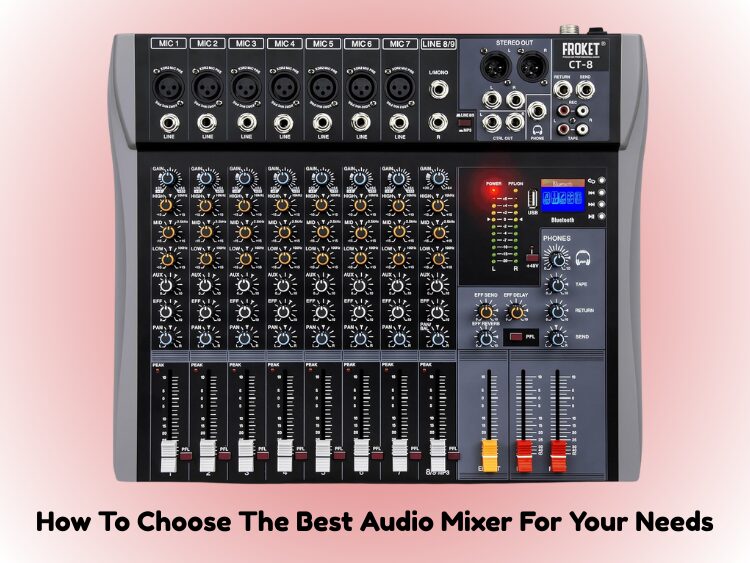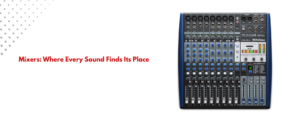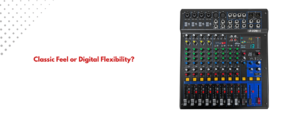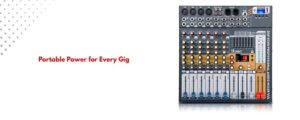People who work with live sound, recording, and streaming need to pick an audio mixer. As a singer, DJ, event planner, or audio tech, your mixer can have a big effect on the sound you make. There are so many options out there that it might be hard to find the best audio mixer for your needs. This blog lists the most important things you should think about when choosing an audio mixer to help you make a choice.
Find Out What the Mixer’s Main Job Is
First, figure out what the mixer’s main job is. Audio mixers of different sizes and shapes are available for different uses. Live bands and artists need a mixer with many channels so that their mics and instruments can connect. One or two people can use a small mixer. For bigger parties or band shows, you need a mixer with more than one track and effects and processing built in. It might be better for audio quality and flexibility to have a mixer with a lot of input tracks that works well with your recording software.
If you’re planning a budget-friendly setup, you may want to review the ultimate buyer’s guide to audio mixers under $200 to find a reliable and affordable option.
Consider Channel Needs
Now you need to choose how many channels you need. The sections of the mixer tell you how many sound sources it can handle. For one singer or a small band, a small mixer with 4 to 8 tracks might be enough. It may be necessary to have a mixer with 16 or more channels for a full band or event with many mics, instruments, and other audio sources. Take a look at your setting and make a plan. To figure out how many channels you need, think about how many mics, instruments, or other gear you’ll need.
Analog vs. Digital Mixers
You should also consider whether you need a conventional or digital mixer. It’s easier to use analog mixers because they have actual settings. They’re good for people who want something simple or don’t know much about recording gear. Digital mixers, on the other hand, have built-in effects, digital signal processing, and more route options for audio. People like digital mixers because they are small and can save and remember event settings. But they might be harder to use, so think about how comfortable you are with technology.
If you’re curious about top digital and powered options this year, check out the top 5 powered audio mixers for 2025.
Quality Sound Is Important
You should also choose mixers based on how good the sound is. The preamps, processors, and EQ settings on your mixer determine how good your mix is. The preamps and processors in high-end speakers are better, which makes the sound smoother and more accurate. Get a mixer with good sound if you’re going to mix music professionally or record high-quality audio. If the sound quality is good, the music will be clear and free of noise, even for small shows or everyday use.
Examine Options for Connectivity
Think about the mixer’s connection options. To link directly to a computer, you might need a mixer with XLR, 1/4″ TRS, RCA, or USB ports. Make sure the mixer has speaker or amplifier outputs if you’re using a PA system. If you want to record with a DAW, pick a mixer that works with your program and has a USB or FireWire port.
Consider Size and Portability
Also, think about the mixer’s size and portability. You’ll need a compact mixer if you play music often. Smaller mixers are easier to move around, while bigger ones might need to be set up somewhere fixed. Most of the time, bigger mixers have more working power, tracks, and options. If you need to take your mixer to a lot of different places, think about how portable it is and how much room it needs.
Easy to Use
The ease of use is another important factor. The more complicated the features, the longer it takes to learn how to use and understand them. If you’ve never mixed sounds before, pick a mixer with simple settings and a user interface that is easy to understand. These days, mixers have LCD screens or touchscreens that make it easier to make changes. Some even come with setup directions or software.
Economic Factors
Take a look at your spending now. Audio mixers range from cheap ones for beginners to high-end ones for professionals. You might want to pick the cheapest option, but the sound and functions might not be as good. You can expect to pay more for a mixer that has more channels, better sound, and better effects or built-in digital processing. Any price range will have a mixer that meets your needs, so think about what you need and how much you can spend.
Maintaining your mixer properly also protects your investment — learn how with this step-by-step guide to cleaning and maintaining your audio mixer.
Conclusion
Finally, the best audio mixer depends on your needs, preferences, and funds. Choose based on the number of tracks, the type of mixing, the sound quality, the number of input options, how portable it is, and how easy it is to use. Having the right mixer can improve the sound and give any event or recording session a more professional sound.




